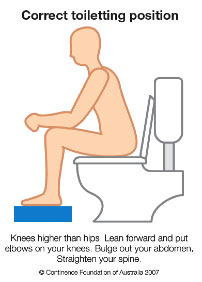
1300 722 206
Contact Us
Bowel management plans are best when tailored specifically to your symptoms. WHRIA’s Pelvic Floor Physiotherapist is able to discuss this with you.
 Generally: Adequate fluid (1.5 – 2 litres/day) and dietary fibre (30 grams/day) intake are needed. Fibre supplements may also be useful e.g. Psyllium husks, Benefibre® and Metamucil® may be considered. A glass of warm water first thing on rising in the morning 10-15 minutes before food may help. Answer the first urge to open your bowels. Keep active. Try the following the posture below during defaecation. Repeated straining may damage the pelvic floor muscles which in turn can affect bladder and bowel control and may also lead to prolapse, where a pelvic organ bulges through the walls of the vagina.
Generally: Adequate fluid (1.5 – 2 litres/day) and dietary fibre (30 grams/day) intake are needed. Fibre supplements may also be useful e.g. Psyllium husks, Benefibre® and Metamucil® may be considered. A glass of warm water first thing on rising in the morning 10-15 minutes before food may help. Answer the first urge to open your bowels. Keep active. Try the following the posture below during defaecation. Repeated straining may damage the pelvic floor muscles which in turn can affect bladder and bowel control and may also lead to prolapse, where a pelvic organ bulges through the walls of the vagina.
If you have a specific enquiry for our WHRIA specialists
Click HereSee our NEWS & RESOURCES section of this website for HEALTH INFORMATION
Useful links:
The Continence Foundation of Australia:
For a guide to appropriate stool type see the Bristol stool scale http://www.continence.org.au/pages/bristol-stool-chart.html
Sherin Jarvis, Pelvic Floor Physiotherapist, Conjoint Lecturer, UNSW









© 2025 Women's Health & Research Institute of Australia. Privacy Policy | Terms of Use | Website by Phil Kurth